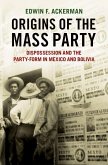This book surveys some of the key intellectual influences in the formation of Australian society by emphasising the impact of the Enlightenment with its commitment to rational enquiry and progress - attitudes which owed much to the successes of the Scientific Revolution. The first part of the book analyses the political and religious background of the period from the First Fleet (1788) to the mid nineteenth century. The second demonstrates the pervasiveness of ideas of improvement - a form of the idea of progress - originally derived from agriculture, but which were to shape attitudes to human nature in fields as diverse as education, penal discipline and race relations. Throughout, the book highlights the extent to which developments in Australia can be compared and contrasted with those in Britain and in the USA.
Hinweis: Dieser Artikel kann nur an eine deutsche Lieferadresse ausgeliefert werden.
Hinweis: Dieser Artikel kann nur an eine deutsche Lieferadresse ausgeliefert werden.
'Gascoigne's book, which is exhaustively researched and gracefully written, investigates the systems of thought that provided the basis for political and social order in a society as bastard as a convict settlement. It is a masterly study of how the ideas of Locke, Bentham and Paine suffused the institutions of the colony.' London Review of Books








